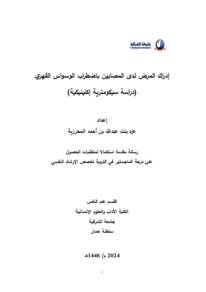Document
إدراك المرض لدى المصابين باضطراب الوسواس القهري : دراسة سيكومترية إكلينيكية.
Source
رسالة ماجستير
Other titles
)Illness perception among people with obsessive-compulsive disorder( )A psychometric clinical case study.
Country
عمان
City
إبراء
Publisher
جامعة الشرقية
Gregorian
2024
Language
Arabic
Thesis Type
رسالة ماجستير
English abstract
This study aimed to identify the perception of illness among people
with obsessive-compulsive disorder and its relationship to some
variables. To achieve this goal, the researcher used a mixed approach
(quantitative and qualitative) and two samples: the first sample
consisted of 210 people with obsessive-compulsive disorder. In
contrast, the second sample was composed of five selected cases, by
intentional method from patients diagnosed with obsessivecompulsive disorder in the mental health clinic at the Ibra Health
Center in the Sultanate of Oman. The researcher used both the BellBrown Obsessive-Compulsive Scale and the Illness Perception Scale
that was developed for the study. The results showed a relatively high
level of awareness of the symptoms of the disease, as the scores on
the illness awareness scale ranged between 158 and 182 out of 215.
This high level reflects patients’ good awareness of the existence of the
problem affecting their daily lives. The study also revealed a great
diversity in patients’ explanations for the causes of their disorder, with
40% of them relying on scientific and psychological explanations, while
60% resorted to cultural and spiritual explanations. As for the
relationship between awareness of the disease and adherence to
ز
treatment, the results showed that in 65% of cases, a deeper
understanding of the disease was associated with better adherence to
treatment. The results also highlighted a clear effect of disease
perception on treatment orientation, as 75% of patients who
understood their disorder from a medical and psychological
perspective were more likely to seek specialized treatments. In
contrast, 80% of those who linked their illness to spiritual causes
initially preferred traditional treatments. An important observation is
that 55% of patients gradually switched from traditional to medical
and psychological treatments as their understanding of the nature of
their disorder increased. Also, 70% of patients who received health
education showed an improvement in their orientation towards
effective treatments. The study recommended developing educational
programs specifically for OCD patients that take into account their
cultural backgrounds, conducting a comprehensive assessment of the
patient’s perception at the beginning of treatment, and integrating
cognitive-behavioral therapy techniques with methods that take into
account the patient’s cultural and spiritual aspects. It also called for
developing health policies that support community awareness and
reduce the stigma associated with mental disorders. Keywords:
awareness of illness, obsessive-compulsive disorder, obsessivecompulsive disorder patients.
Origin
جامعة الشرقية
Arabic abstract
**هدفت هذه الدراسة إلى التعرف على إدراك المرض لدى مرضى اضطراب الوسواس القهري وعلاقته ببعض المتغيرات.**
ولتحقيق هذا الهدف، استخدم الباحث منهجًا مختلطًا (كمي ونوعي) مع عينتين:
- العينة الأولى تكونت من 210 أشخاص يعانون من اضطراب الوسواس القهري.
- العينة الثانية ضمت خمس حالات مختارة بطريقة قصدية من المرضى المشخصين باضطراب الوسواس القهري في عيادة الصحة النفسية بمركز إبراء الصحي في سلطنة عمان.
**أدوات الدراسة:**
- مقياس "بيل-براون" للوسواس القهري.
- مقياس إدراك المرض الذي تم تطويره للدراسة.
**النتائج الرئيسية:**
- أظهرت النتائج مستوى مرتفعًا نسبيًا من الوعي بأعراض المرض، حيث تراوحت الدرجات على مقياس الوعي بالمرض بين 158 و182 من أصل 215. يعكس هذا المستوى المرتفع وعيًا جيدًا لدى المرضى بوجود مشكلة تؤثر على حياتهم اليومية.
- أظهرت الدراسة تنوعًا كبيرًا في تفسيرات المرضى لأسباب اضطرابهم، حيث اعتمد 40% منهم على تفسيرات علمية ونفسية، في حين لجأ 60% إلى تفسيرات ثقافية وروحانية.
- بالنسبة للعلاقة بين إدراك المرض والالتزام بالعلاج، أظهرت النتائج أن 65% من الحالات التي تمتعت بفهم أعمق للمرض كان لديهم التزام أفضل بالعلاج.
- أظهرت النتائج تأثيرًا واضحًا لإدراك المرض على التوجه نحو العلاج، حيث كان 75% من المرضى الذين فهموا اضطرابهم من منظور طبي ونفسي أكثر ميلًا لطلب العلاجات المتخصصة، في حين فضل 80% من المرضى الذين ربطوا مرضهم بأسباب روحانية العلاجات التقليدية في البداية.
- لوحظ أن 55% من المرضى انتقلوا تدريجيًا من العلاجات التقليدية إلى العلاجات الطبية والنفسية مع زيادة فهمهم لطبيعة اضطرابهم.
- أظهر 70% من المرضى الذين تلقوا توعية صحية تحسنًا في توجههم نحو العلاجات الفعالة.
**التوصيات:**
- تطوير برامج توعوية مخصصة لمرضى الوسواس القهري تأخذ بعين الاعتبار خلفياتهم الثقافية.
- إجراء تقييم شامل لإدراك المريض في بداية العلاج.
- دمج تقنيات العلاج المعرفي السلوكي مع أساليب تراعي الجوانب الثقافية والروحانية للمريض.
- تطوير سياسات صحية تدعم التوعية المجتمعية وتقلل من الوصمة المرتبطة بالاضطرابات النفسية.
**الكلمات المفتاحية:** إدراك المرض، اضطراب الوسواس القهري، مرضى اضطراب الوسواس القهري.
ولتحقيق هذا الهدف، استخدم الباحث منهجًا مختلطًا (كمي ونوعي) مع عينتين:
- العينة الأولى تكونت من 210 أشخاص يعانون من اضطراب الوسواس القهري.
- العينة الثانية ضمت خمس حالات مختارة بطريقة قصدية من المرضى المشخصين باضطراب الوسواس القهري في عيادة الصحة النفسية بمركز إبراء الصحي في سلطنة عمان.
**أدوات الدراسة:**
- مقياس "بيل-براون" للوسواس القهري.
- مقياس إدراك المرض الذي تم تطويره للدراسة.
**النتائج الرئيسية:**
- أظهرت النتائج مستوى مرتفعًا نسبيًا من الوعي بأعراض المرض، حيث تراوحت الدرجات على مقياس الوعي بالمرض بين 158 و182 من أصل 215. يعكس هذا المستوى المرتفع وعيًا جيدًا لدى المرضى بوجود مشكلة تؤثر على حياتهم اليومية.
- أظهرت الدراسة تنوعًا كبيرًا في تفسيرات المرضى لأسباب اضطرابهم، حيث اعتمد 40% منهم على تفسيرات علمية ونفسية، في حين لجأ 60% إلى تفسيرات ثقافية وروحانية.
- بالنسبة للعلاقة بين إدراك المرض والالتزام بالعلاج، أظهرت النتائج أن 65% من الحالات التي تمتعت بفهم أعمق للمرض كان لديهم التزام أفضل بالعلاج.
- أظهرت النتائج تأثيرًا واضحًا لإدراك المرض على التوجه نحو العلاج، حيث كان 75% من المرضى الذين فهموا اضطرابهم من منظور طبي ونفسي أكثر ميلًا لطلب العلاجات المتخصصة، في حين فضل 80% من المرضى الذين ربطوا مرضهم بأسباب روحانية العلاجات التقليدية في البداية.
- لوحظ أن 55% من المرضى انتقلوا تدريجيًا من العلاجات التقليدية إلى العلاجات الطبية والنفسية مع زيادة فهمهم لطبيعة اضطرابهم.
- أظهر 70% من المرضى الذين تلقوا توعية صحية تحسنًا في توجههم نحو العلاجات الفعالة.
**التوصيات:**
- تطوير برامج توعوية مخصصة لمرضى الوسواس القهري تأخذ بعين الاعتبار خلفياتهم الثقافية.
- إجراء تقييم شامل لإدراك المريض في بداية العلاج.
- دمج تقنيات العلاج المعرفي السلوكي مع أساليب تراعي الجوانب الثقافية والروحانية للمريض.
- تطوير سياسات صحية تدعم التوعية المجتمعية وتقلل من الوصمة المرتبطة بالاضطرابات النفسية.
**الكلمات المفتاحية:** إدراك المرض، اضطراب الوسواس القهري، مرضى اضطراب الوسواس القهري.
Category
Theses and Dissertations



